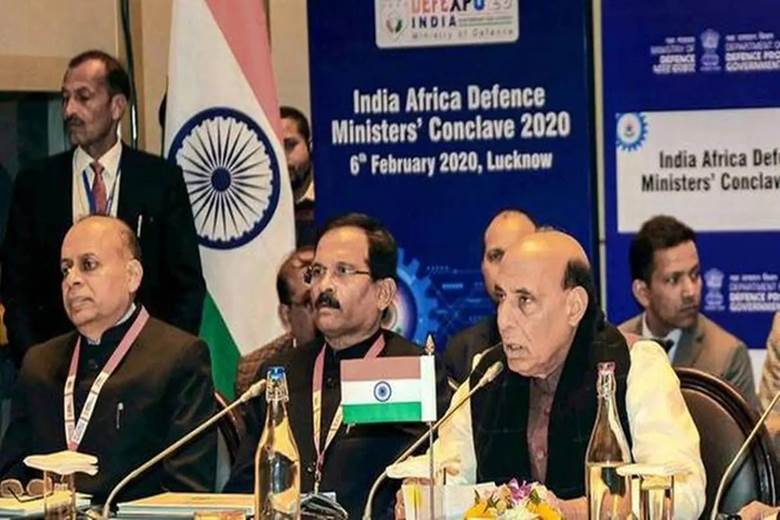Description

Copyright infringement not intended
Context: India-Africa Defence Dialogue to be held on October 18 on the sidelines of DefExpo 2022 in Gandhinagar, Gujarat.
Details:
- The broad theme of the dialogue is ‘India-Africa: Adopting Strategy for Synergising and Strengthening Defence and Security Cooperation’.
- India’s approach towards Africa is guided by the Kampala Principlesenunciated by Prime Minister Shri Narendra Modi in 2018.
- The Kampala Principles promote ownership of private sector engagement (PSE) through development co-operation by partner countries and ensure the alignment of PSE projects and programmes with national sustainable development priorities.
- The first-ever India-Africa Defence Ministers Conclave was held in Lucknow, Uttar Pradesh in conjunction with DefExpo on February 06, 2020.

Background of relations:
- India’s relations with Africa date back several centuries. The presence of Indians in East Africa is documented in the 'Periplus of the Erythraean Sea' or Guidebook of the Red Sea by an ancient Greek author written in 60 AD.
- The geographical proximity and easy navigabilityin Indian Ocean resulted in well-established trade network between India and the Swahili Coast predating European exploration.
- More concrete relation between India and Africa begins to emerge during the Islamic agewhich is evident through the accounts of Venetian traveller Marco Polo.
- Political connection during the colonial era was linked through M.K Gandhiwho began his political career in South Africa, became the leader of colonized and established Indian Natal Congress in 1894.
- After India got independent, it raised voice for African liberation taking their case to all the available international forums. End of racial struggle and decolonization became the rallying point of India–Africa relations.
- India was a forerunner as a champion of the interests of the developing countries from Africa, particularly through the Bandung Declaration of 1955, the Group of 77, and the Non Aligned Movement (NAM).
- Africa is home to over half a dozen of the fastest growing countries of this decade such as Rwanda, Senegal, and Tanzania etc making it one of the growth pole of the world.
- African continent has a population of over one billion with a combined GDP of 2.5 trillion dollars making it a huge potential market.
- Africa is a resource rich continentdominated by commodities like crude oil, gas, pulses and lentils, leather, gold and other metals, all of which India lack in sufficient quantities.
- India’s duty-free tariff preferential scheme for Least Developed Nation(LDCs) launched in 2008 has benefited 33 African states.
- Multilateral engagement was launched with the first India Africa Forum Summit(IAFS) in 2008.
- India is investing in capacity building providing more than $1 billion in technical assistance and training to personnel under the Indian Technical and Economic Cooperation(ITEC) program.
- As a full member of African Capacity Building Foundation(ACBF), India has pledged $1 million towards ACBF’s sustainable development, poverty alleviation, and capacity building initiative.
- India has invested $100 million in the Pan-African E-Networkto bridge the digital divide in Africa, leveraging its strengths in information technology.
- Indian military academies offer training to military officersfrom a number of African states.
- India has also unveiled the Vision Document of the Asian Africa Growth Corridorwhich is jointly prepared by Indian and Japanese think tanks.
- Under the Vaccine Maitri initiative, India supplied 24.7 million doses of Made of India Covid vaccines to 42 countries in Africa.
- Moreover, over 3 million strong Indian diaspora in Africaalso proves to a crucial strategic asset for India to further its relations with African countries.
Trade Relations:
- Trade between the African subcontinent and India increased from $7.2 billion in 2001 to $59.9 billion in 2017, making India the continent’s fourth-largest national trading partner, according to Exim Bank and the African Export-Import Bank (Afriexim Bank).
- Trade with India accounted for more than 6.4 per cent of total African trade in 2017.
- Bilateral trade between India and the 48 countries of sub-Saharan Africa was valued at $46.82 billion in 2020-21, down from $55.70 billion in 2019-20.
- India has a negative trade balance with sub-Saharan Africa, the Ministry figures show.
- Ministry of External Affairs said that 38 African nations have benefited from India’s Duty Free Tariff Preference (DFTP) scheme which provides duty free access to 98.2 per cent of India’s total tariff lines.
- Lines of Credit (LoCs) worth $12.26 billion have so far been extended to African countries, making them the second-largest recipient of India’s concessional loans, the MEA said.
- Mauritius is the first and only African country so far to have a CECPA (Comprehensive Economic Cooperation and Partnership Agreement) with India, an agreement that aims at building trade ties between the two countries.
https://pib.gov.in/PressReleasePage.aspx?PRID=1868186
















